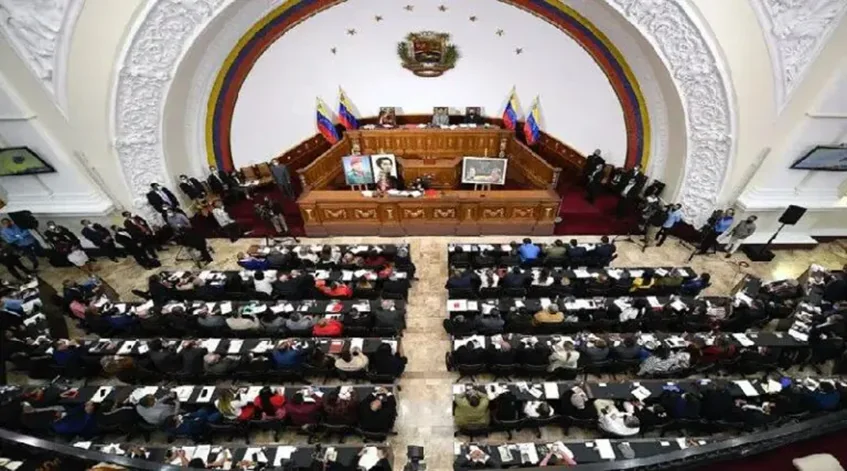Venezuela Declares Economic Emergency: Maduro’s Decree Targets US Sanctions & National Recovery
Venezuela’s National Assembly approved an Economic Emergency State Decree on Thursday, proposed by President Nicolás Maduro. The measure, grounded in Article 111 of the parliament’s Internal Regulations, aims to implement strategies to strengthen the national economy amid external pressures, particularly sanctions imposed by the Trump administration.
Legislative Process and Next Steps
Assembly President Jorge Rodríguez announced the decree’s approval by a qualified majority, confirming it will be sent to the Constitutional Chamber of the Supreme Court (TSJ) and published in the Official Gazette. “This decree is approved and will be forwarded for publication,” Rodríguez stated.
Economic Resilience Amid Global Challenges
Jesús Faría, head of the Permanent Commission on Economy, Finance, and National Development, emphasized the decree’s importance in a hostile global context. “We’ve endured blockades and challenges, achieving 15 consecutive quarters of growth. This decree consolidates Venezuela’s wealth and unites us against economic warfare,” Faría declared.
Constitutional Backing and Public Impact
Nicolás Maduro Guerra, another lawmaker, highlighted the decree’s constitutional legitimacy and benefits for citizens. “This decree supports the people’s interests and advances President Maduro’s economic plan,” he said.
Source: Telesurenglish.net
Venezuela Unveils Guyana’s False Flag Plan
On Wednesday, Venezuelan Foreign Affairs Minister Yvan Gil published a statement emphasizing that Guyanese President Mohamed Irfaan Ali demonstrated desperation and dishonesty in his attempt to disregard the 1966 Geneva Agreement as the only legitimate and suitable mechanism to resolve the territorial dispute over the Essequibo region. Below is his full statement:
“The Bolivarian Republic of Venezuela categorically rejects the statement issued by the Cooperative Republic of Guyana regarding the communication sent by Venezuela to the Secretary-General of the United Nations.
In its statement, Guyana continues its desperate and irresponsible attempt to distort and disregard the legally binding obligations undertaken with the signing of the 1966 Geneva Agreement, under which the territorial dispute over the Essequibo region must be resolved through a practical and mutually acceptable arrangement between the parties.
Venezuela has demonstrated that Guyana not only sabotaged the good offices process developed by the UN Secretary-General in accordance with the Geneva Agreement, but also exerted undue and illegitimate pressure on the UN Secretariat to have the dispute irregularly referred to the International Court of Justice, in violation of the UN Charter itself—thanks to lobbying and financial support from ExxonMobil.
The Bolivarian Republic of Venezuela reaffirms that the International Court of Justice has no jurisdiction to hear Guyana’s unilateral claim regarding the “validity” of the 1899 arbitral award. True to its historical stance, Venezuela will never recognize any decision issued by that body concerning the territorial dispute over the Essequibo region.
Source: Telesurenglish.net
Caracas Activates Telecommunications and New Technologies Engine to Boost the Sector in Venezuela
Venezuela launches the Telecom & New Tech Engine with 340+ firms to boost sector growth, deploy 5G/AI, and ensure nationwide connectivity under President Maduro’s leadership.
At an event marked by the participation of over 340 national and international companies, the Telecommunications and New Technologies Engine was activated. This project aims to strengthen Venezuela’s telecommunications sector, ensuring technological sovereignty and improving service quality for citizens.
President Nicolás Maduro inaugurated the event, highlighting a 7% sector growth in 2023 and announcing the addition of 40 new companies in 2024.
He emphasized Venezuela’s progress amid sanctions and called for nationwide high-speed internet, eliminating “dark zones,” and equipping schools/universities with intercommunication systems. Major General Jorge Márquez will lead efforts to achieve these goals.
Source: Telesurenglish.net
President Maduro Reaffirms Commitment to Venezuela’s Seven Transformations Plan (7T)
During the latest episode of his weekly program “Con Maduro+”, Venezuelan President Nicolás Maduro reaffirmed his dedication to the Seven Transformations Plan (7T), a central pillar of his government aimed at ensuring national well-being and comprehensive development.
Maduro emphasized that all seven pillars of the plan are being implemented simultaneously across communities, prioritizing the needs of the people. “We are committed to driving the transformations Venezuela requires to secure the right to a future for all Venezuelans,” he declared, stressing a focus on social inclusion and equitable development.
The president also highlighted the importance of building a new global geopolitics rooted in a “pluripolar and multicentric” vision. He outlined the need for clear strategies addressing economic growth, urban development, public services, security, human rights, state reform, and a holistic ecological model. These steps, Maduro argued, are critical to advancing toward a “more balanced and just world by 2031.”
Source: Telesurenglish.net
President Maduro Accuses Trump of Waging “Immoral Economic Warfare” Against Venezuela
In the latest episode of his TV program “Con Maduro +”, Venezuelan President Nicolás Maduro condemned the “commercial and economic war” unleashed by U.S. President Donald Trump.
During the 75th installment of the show, aired on April 7, Maduro criticized U.S.-imposed coercive measures, which he claimed now extend globally as tools of “American imperialism.”
President Maduro labeled these sanctions “immoral and illegal,” arguing that harming nations to colonize them is indefensible. He framed sanctions as a U.S. tactic to control sovereign states, citing Nicaragua and Cuba as examples of countries suffering under similar policies.
Source: Telesurenglish.net



